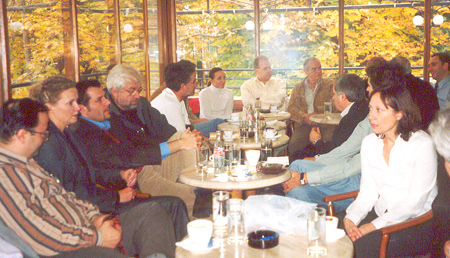|
Remarks by Athanasios Parisis
European Bureau for Lesser Used Languages
Conference on Linguistic Diversity in Greece
Thessaloniki, November 15, 2002
 Read
this page in Greek | Read
this page in Greek |  Read
this page in Macedonian Read
this page in Macedonian
Welcoming Address by the President of the Greek branch of the European
Bureau for Lesser Used Languages (EBLUL), Mr. Athanasios Parisis to the
first International EBLUL Conference in Thessaloniki, 15 November, 2002
Subject of conference: Promotion of the lesser used languages in Greece

[L-R] Professor Vasiliadis (Professor of
Sociology), Regina Jensdottir (Council of Europe - Minority Languages),
Markus Warasin (Secretary General of EBLUL), Bojan Brezigar (President
of EBLUL), Athanasios Parisis (President of Greek EBLUL), Marianna
Bekiari (Macedonian Linguistic Minority), Christian Voss (GLOCO
LOG - Germany), Dimitris Papadimitriou (Macedonian Linguistic Minority),
Prof. Domenico Morelli (President, National Federation of Minority
Languages - Italy), Teresa Condeco (Languages Unit Directorate
- EC), Pavlos Voskopoulos (Macedonian Linguistic Minority) |
Mr. President, Bojan Brezigar, Honoured guests,
On behalf of the Greek EBLUL Committee I take great pleasure in welcoming
you to the first EBLUL international conference dedicated to the various
linguistic groups in Greece.
Across the European Union, no fewer than forty million people speak languages
in their everyday lives, which are different from the official language
of the state in which they are living. At present this figure represents
10% of the total European population, but shortly, with the expansion
of the Union, the number of people speaking a different language from
the official language of their state will be much, much greater. Greece,
too, is no exception; however vigorously the state may deny it, the facts
tell their own story. A by no means negligible section of the Greek population
is bilingual. It is not possible to provide precise figures, since none
of the censuses carried out to date has included a question on language.
The one exception was the census of 1920, yet the figures it yielded for
the northern regions of the country were never published.
Moreover, the long-standing policy of marginalisation and suppression
has succeeded, naturally enough, in reducing the actual number of those
speaking the non-official languages. This hostile treatment of heteroglossy
in Greece had its beginnings in the early days of the modern Greek state,
170 years ago. In those areas of the country where Arvanitika was prevalent,
every effort was made to discourage its use. There was perhaps some justification
for this in the desperate efforts being made to unite the regional populations
into a single Greek state, using as a means to this end a policy of homogenisation
of the various populations.
At the beginning of the 20th century, when new territories were annexed
by the Greek state, the process of displacing alternative languages and
forcing their speakers to assimilate the Greek language and Greek national
ideology - one state, one nation, one language, one religion - assumed
new dimensions. The state resorted to violence, persecution, exchanges
of populations and the mass 'cleansing' of villages, which refused to
submit. Later, in the course of the Civil War, many tens of thousands
of individuals, among them whole villages, were forced to flee as political
refugees to eastern Europe. Some of the children of these refugees are
still living in exile, a situation almost incomprehensible in the context
of the modern Europe.
Those of us who remained in Greece were subjected to special schooling,
kept in the classroom all day to minimise our contact with our family
environment - the environment where our native tongue was spoken. It is
worth mentioning that the 1961 census lists just ten child day care centres
for the region of Messenia, whereas in the area of Florina no fewer than
48 such centres were in operation. The numbers are, of course, inversely
proportional to the size of population in each region actually in need
of these centres. The selective policy of the Queen Frederika Foundation,
which was accompanied by the movement of 'poor children' - the actual
phrase used - to isolated schools in southern Greece, was intended to
encourage the children to change their language and thereby further the
process of national integration.
In the years which followed the tactics of psychological violence, the
undermining of the dignity of the child and the intimidation of the parent
- all produced the results the state desired, the 'persuasion' of individuals
to deny their own identity, their tradition, their language. And this
in a Europe, which claims to respect the ideal, among others, of respect
for human rights and the linguistic and cultural disparity of its peoples.
As President of the Greek branch of EBLUL I should like to stress the
need to introduce our languages into the Greek educational system. We
also seek access for the linguistic communities of our country to the
mass media, radio and television.
We very much hope that in this endeavour we shall enjoy the support of
the Brussels office, the European Parliament, the European Commission,
the Council of Europe and all the other agencies of the European Union
with an interest in these issues.
Athanasios Parisis
|



























